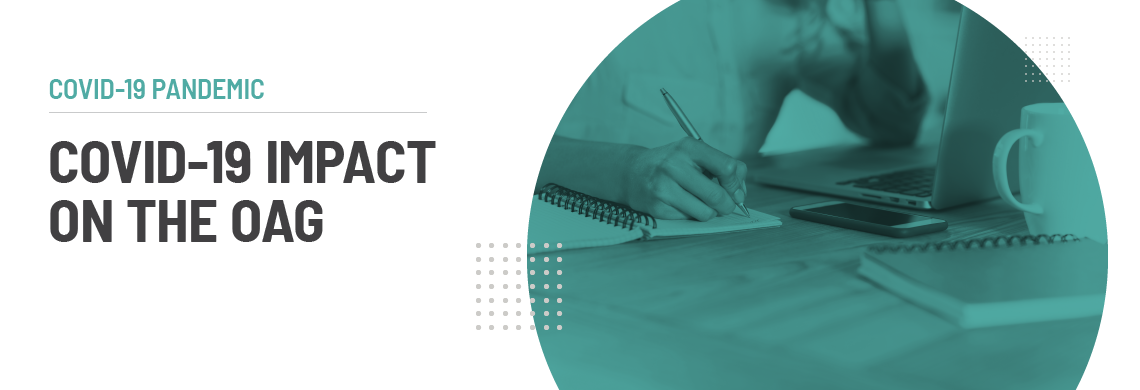COVID-19 Impact on the OAG
COVID-19 impact on the OAG
The COVID-19 pandemic and the government’s response have had a direct impact on the work of the Office of the Auditor General of Canada (OAG), across its performance and financial audits. The Office’s role to carry out financial statement audits, including the audit of the Public Accounts of Canada, and to raise matters of importance through performance audits and audits of Crown Corporations, has not changed. How the Office goes about carrying out this work—that has absolutely changed.
As in all other organizations, the COVID-19 pandemic had far reaching impacts on the OAG. By mid-March, OAG employees were working remotely, as were some or all the employees of organizations audited by the Office. All travel for OAG auditors had been suspended, in response to public health guidelines. Furthermore, the OAG had initial difficulties in obtaining audit evidence given the challenging work environment and reduced or closed access to the organizations the Office audits.
As part of the Office’s response to the pandemic, the OAG collaborated with the federal organizations it audits, as well as with central agencies in the federal government, to adapt to the circumstances and develop workable solutions to complete its audit work.
Performance audit

In spring 2020, the House of Commons called upon the Auditor General of Canada to look into the government spending related to the COVID-19 pandemic and to report to Parliament no later than 1 June 2021.
To strike the balance between serving parliamentarians and mitigating the impacts of the OAG’s work on public servants, the Office reviewed its planned performance audit work. Audits originally targeted for release in fall 2020 were delayed until spring 2021, and audits originally planned for release in spring 2021 were deferred indefinitely. These decisions freed up capacity to complete several priority audits on COVID-19 measures.
Please consult the COVID‑19 section of our website for our upcoming and published reports.
This work is intended to provide parliamentarians and Canadians with objective information about the government’s response effort, and to inform long-term improvement and results for Canada.
In developing this plan, the OAG consulted with senior government officials and external stakeholders and experts, and conducted its own analysis. Decisions about what to audit considered the cost of the measures and activities and their impact on Canadians, the risks involved, the timeliness and value added of each audit, as well as the extent to which the measure or activity was intended to help vulnerable populations and is aligned with the United Nations Sustainable Development Goals and underlying targets.
Considering these factors, the COVID audits that the Office has conducted, focused on the government’s measures related to emergency preparedness and early-response actions, health and safety protections, and support to individuals and businesses. Audits to be released later this year focus on other liquidity support and capital relief. More audits related to COVID‑19 are planned for 2022.
The audit work program also looks beyond the COVID‑19 pandemic to reflect other matters of concern to parliamentarians and Canadians, such as climate change and cybersecurity. It includes the critical audit work the OAG conducts in all three territories as well as the work on environment and sustainable development undertaken by the Commissioner of the Environment and Sustainable Development on behalf of the Auditor General.
Financial audit
The COVID-19 pandemic has resulted in new risks related to the operations and financial reporting processes of the federal and territorial governments and entities that the OAG audits. Key risk areas that have impacted the Office’s audit approaches include:

- changes in controls over financial reporting processes due to remote working arrangements along with increased susceptibility to digital access, privacy, or data storage breaches;
- increased number of fraud risk factors both in terms of incentives/pressures and opportunities because of changing conditions;
- new areas of significant judgment, increased uncertainty involved in estimating financial statement balances such as new indicators of obsolescence of financial or tangible capital assets;
- and additional disclosures on measurement uncertainty and subsequent events.
To address these new risks, the OAG adjusted its approaches to auditing the financial statements of departments and government organizations so that it would be able to complete the financial audit work that it is required by legislation to perform.
As expected, the Office’s work also increased because of the increase in government spending in response to the pandemic, which had significant effects on the financial statements of departments and government organizations.
Despite some challenges due to the continuing COVID‑19 pandemic, the OAG completed its annual financial audits, and reported to the Parliament of Canada on its work in the annual Commentary report. In 2020–21, this report included the results of additional work requested by the Parliament of Canada on certain provisions of the COVID-19 Emergency Response Act. It also included an overview of COVID‑19 measures, and the audit work done, to help Parliamentarians exercise oversight of government finances.
